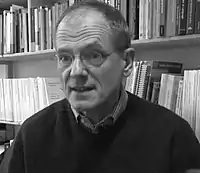Cornelis Kees de Bot | |
|---|---|
 Kees de Bot in 2009. | |
| Born | 11 March 1951 |
| Alma mater | |
| Known for | |
| Spouse | Marjolijn Verspoor |
| Scientific career | |
| Fields | |
| Institutions | |
| Thesis | Visuele Feedback van Intonatie (1982) |
| Doctoral students | Wander Lowie (1998)[1] |
| Website | de Bot on the website of the University of Groningen |
Cornelis Kees de Bot (born 1951) is a Dutch linguist. He is currently the chair of applied linguistics at the University of Groningen, Netherlands,[2] and at the University of Pannonia. He is known for his work on second language development and the use of dynamical systems theory to study second language development.[3]
Career
De Bot obtained his PhD degree in general linguistics and applied linguistics in 1982 at the University of Nijmegen. His PhD research concerned the use of visualizations of intonation as a teaching aid.
In May 1994 he became chair of Applied Linguistics and head of department at the University of Nijmegen. In November 2002 he became chair of Applied Linguistics at the University of Groningen. He is a trustee of the TESOL International Research Foundation and a member of the Program Committee of the Department of Modern Languages of Carnegie Mellon University.
He is co-editor of a series Studies in Bilingualism from John Benjamins Publishing Company. He has published books and articles in the field of applied linguistics. He is chair of the board of the School of Behavioral and Cognitive Neurosciences in Groningen. He recently acted as guest editor of a special issue on language attrition.of the journal Studies in Bilingualism [4]
He is an associate editor of The Modern Language Journal, a peer-reviewed academic journal.[5]
Research
He is one of the members of the "Dutch School of Dynamic Systems" who proposed to apply time-series data to study second language development along with van Geert, Lowie, and Verspoor. His research concerns a number of topics including foreign language attrition, language and dementia in multilingual settings, maintenance and shift of minority languages and the psycholinguistics of bilingual language processing, and more recently the application of dynamic systems theory in SLA and multilingualism.
In 2015 de Bot published his first article on circadian rhythms and second language development,[6] followed by another co-authored article (Fang Fang) in 2017.[7]
Works
In 2004 he wrote a seminal article along with Lowie and Verspoor on second language development which applied the dynamic systems theory to study second language writing development. This was the first research paper in which time-series data were used to explicate changes in the development of second language writing.[8]
In an interview, published in Alkalmazott Nyelvtudomány, (Applied linguistics in Hungarian) de Bot said that he is in interested in the application of circadian rhythm in second language acquisition.[9]
Supervision
de Bot has supervised numerous PhD students, including Wander Lowie,[10] Tal Caspi,[11] and Belinda Chan.[12]
Awards
Bibliography
Books
Articles
- "Word production and the bilingual lexicon." (1993)
- "The psycholinguistics of the output hypothesis." (1996)
- "Toward a lexical processing model for the study of second language vocabulary acquisition: Evidence from ESL reading." (1997)
- "Producing words in a foreign language: Can speakers prevent interference from their first language?" (1998)
- "A bilingual production model: Levelt’s “speaking” model adapted." (2000)
- "The multilingual lexicon: Modelling selection and control." (2004)
- "Complex systems and applied linguistics." (2007)
- "A dynamic systems theory approach to second language acquisition." (2007)
- "An identity approach to second language acquisition." (2011)
- "First language attrition." (2013)
References
- ↑ "Wander Lowie: The Acquisition of Interlanguage Morphology: A Study into the Role of Morphology in the L2 learner's Mental Lexicon". University of Groningen. 1998.
- ↑ "Cornelis de Bot – Faculty of Arts". University of Groningen. 3 February 2018.
- ↑ "Cornelis Kees de Bot – WorldCat". WorldCat. 8 February 2018.
- ↑ "I find this a fascinating area – Interview with Kees de Bot". Egyetemunk.com. 2012.
- ↑ "The Modern Language Journal – Editorial Board". Wiley.com. 6 October 2018.
- ↑ De Bot, Kees (2015). "Circadian rhythms and second language development" (PDF). International Journal of Bilingualism. 19 (2): 142–155. doi:10.1177/1367006913489201. S2CID 220702178.
- ↑ De Bot, Kees; Fang, Fang (2017). "Circadian Rhythms and Second Language Performance". Studies in Second Language Learning and Teaching. 7 (1): 47–60. doi:10.14746/ssllt.2017.7.1.3.
- ↑ Lowie, W. M.; Bot, K. de; Verspoor, M. H. (2004). "Dynamic systems theory and variation: a case study in L2-writing". Words in Their Places. A Festschrift for J. Lachlan: 407–421.
- ↑ "Műhelybeszélgetés Kees de Bottal" (PDF). Alkalmazott Nyevtudomány. 2012.
- ↑ "Wander Lowie: The Acquisition of Interlanguage Morphology: A Study into the Role of Morphology in the L2 learner's Mental Lexicon". University of Groningen. 1998.
- ↑ "Tal Caspi: A Dynamic Perspective on Second Language Development" (PDF). University of Groningen. 2010.
- ↑ "Belinda Chan: A Dynamic Approach to the Development of Lexicon and Syntax in a Second Language" (PDF). University of Groningen. 2015.
- ↑ de Bot, Cornelis (2005). Second Language Acquisition: An Advanced Resource Book. Routledge Taylor & Francis Group. p. 320. ISBN 9780415338707.
- ↑ de Bot, Cornelis (2009). Language Development Over the Lifespan. Routledge Taylor & Francis Group. p. 312. ISBN 9780415998536.
- ↑ Verspoor, Marjolijn (2011). A Dynamic Approach to Second Language Development. Methods and Techniques. John Benjamins Publishing Company. p. 211. ISBN 9789027219985.
- ↑ de Bot, Cornelis (2015). A History of Applied Linguistics From 1980 to the Present. Taylor & Francis. p. 168. ISBN 9781138820661.
External links
- Professor de Bot on the University of Groningen's website: https://www.rug.nl/staff/c.l.j.de.bot/
- Professor de Bot on the website of the Országos Doktori Tanács: https://doktori.hu/index.php?menuid=192&sz_ID=11907